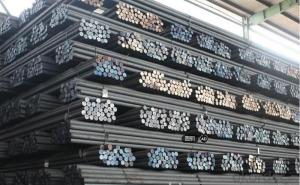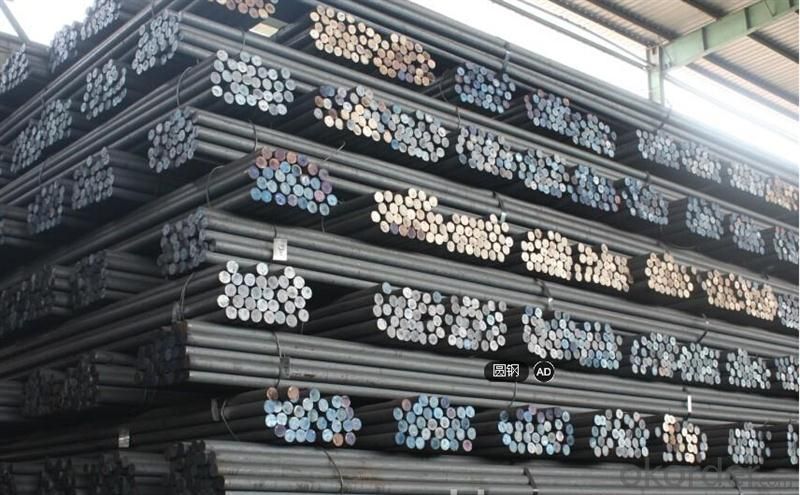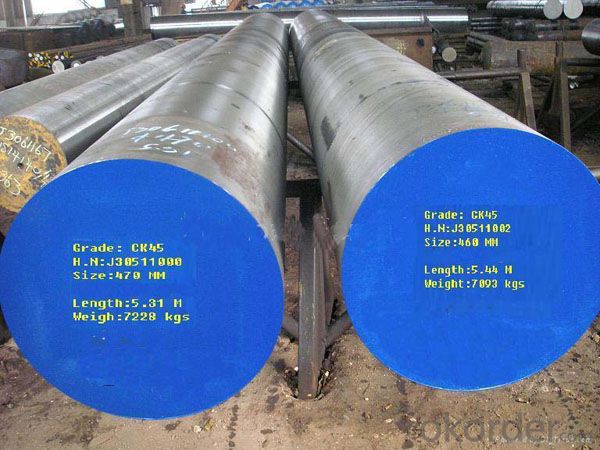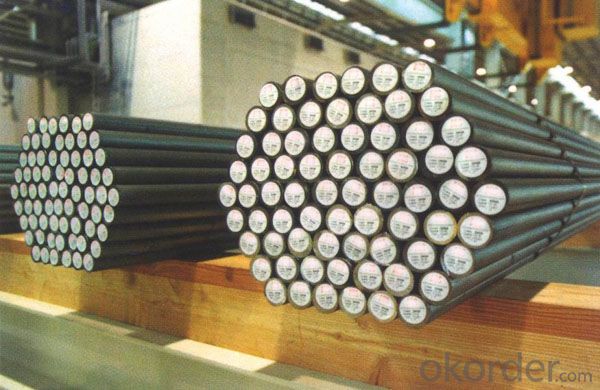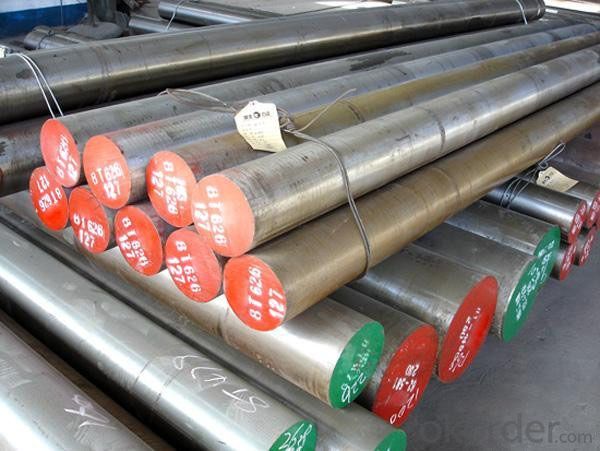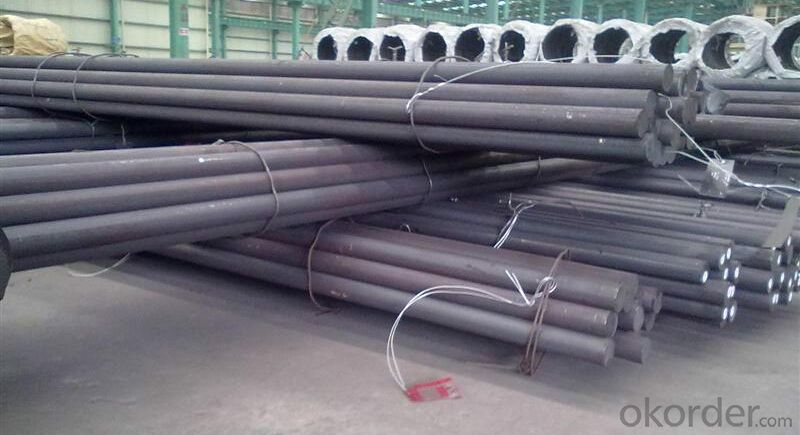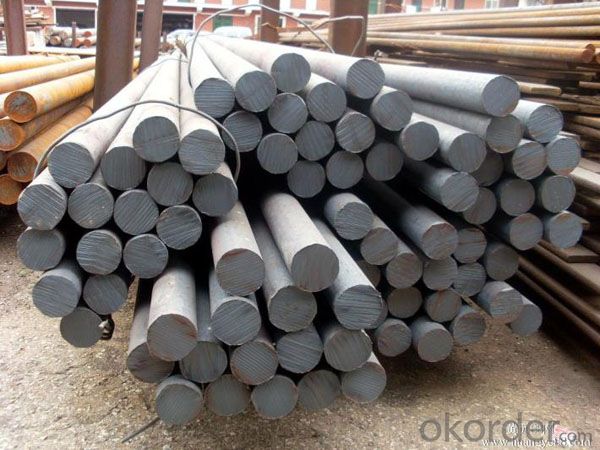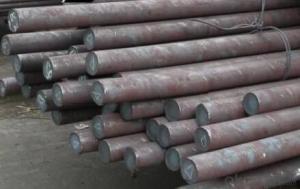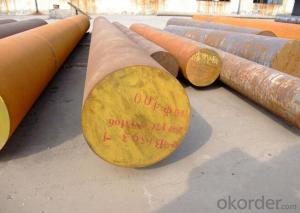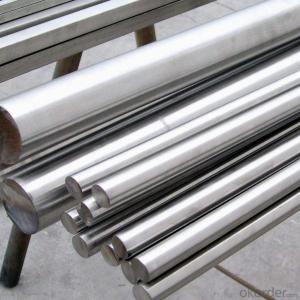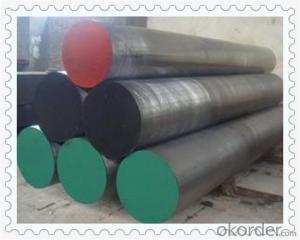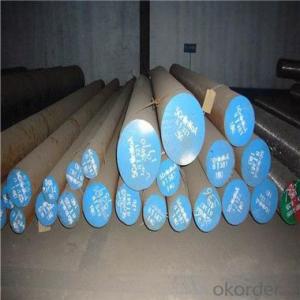Special Steel 8620H 40CrNiMoA Iron Round Steel Bar
- Loading Port:
- Qingdao
- Payment Terms:
- TT OR LC
- Min Order Qty:
- 5 m.t.
- Supply Capability:
- 100000 m.t./month
OKorder Service Pledge
Quality Product, Order Online Tracking, Timely Delivery
OKorder Financial Service
Credit Rating, Credit Services, Credit Purchasing
You Might Also Like
Specification
Type:
Carbon Steel,Spring Steel,Bearing Steel,Gear Steel,Deformed Steel,Stainless Steel,Alloy Steel
Shape:
Steel Coil,Steel Sheet,Steel Wire Rod,Steel Flat Bar,Steel Square Bar,Steel Angle,Steel Round Bar,Steel Billets
Technique:
Hot Rolled,Cold Rolled,Cold Drawn,ERW,Forged,Saw,Extruded,EFW,Spring
Surface Treatment:
Galvanized,Coated,Copper Coated,Color Coated,Oiled,Dry,Chromed Passivation,Polished,Bright,Black,PVDF Coated
Certification:
ISO,SGS,BV,IBR,RoHS,CE,API,BSI,UL
Thickness:
50-500mm
Width:
50-500mm
Length:
6-12m
Outer Diameter:
50-500mm
Net Weight:
92kg-18510kg
Packaging:
Seaworthy packaging
Special Steel 8620H 40CrNiMoA Iron Round Steel Bar
Detailed Information of Special Steel 8620H 40CrNiMoA Iron Round Steel Bar
| Name | Steel Round Bar |
| Shape | Round Bar/Square Bar/Flat Bar/Plate/Wire |
| Standard | GB/ASTM/SAE/AISI/DIN/JIS/EN/BS |
| Surface Treatment: | Black/Peeling/Polished/Machined |
| Delivery Condition: | Hot Rolled or Forged/Peeled or Black Surface |
| Test | SGS/UT 100% Elements Testing |
| Certificate: | ISO/Mill Certificate |
| Service: | 24 hours online service / |
| more than 20 years trading and manufacture | |
| Quality Assurance: | the third party inspection, such as SGS, BV, TUV…etc. is acceptable |
| Packaging Details: | Seaworthy Packaging or as per customer's packing instruction |
Product Overviews of Special Steel 8620H 40CrNiMoA Iron Round Steel Bar
| Product Name | Typical Grades | Diameter(mm) | Standard Adopted |
| Carbon Steel | 20 (1020/S20C/C22) | ||
| 40 (1040/S40C/C40) | Ø16-Ø300 | ||
| 45 (1045/S45C/C45) | |||
| Bearing Steel | GCr9 (51100/SUJ1) | ||
| GCr15 (52100/SUJ2/100Gr6) | Ø12-Ø250 | ||
| GCr9SiMn (A485-Gr.1/SUJ3) | GB/SAE/ | ||
| Cr-Mo Steel | 20Cr (5120/SCr420H/20Cr4) | JIS/DIN | |
| 40Cr (5140/SCr440/41Cr4) | Ø12-Ø250 | ||
| 42CrMo(4140/SCM440/42CrMo4) | |||
| Gear Steel | 20CrNiMo | ||
| 20CrMn(5115/SMnC420/20MnCr5) | Ø16-Ø600 | ||
| 20CrNiMo(8620/SNCM220/20CrMiMo2) |
Company Introduction of Special Steel 8620H 40CrNiMoA Iron Round Steel Bar
CNBM International Corporation is the most import and export platform of CNBM group(China National Building Material Group Corporation) ,which is a state-owned enterprise, ranked in 270th of Fortune Global 500 in 2015.
With its advantages, CNBM International are mainly concentrate on Cement, Glass, Iron and Steel, Ceramics industries and devotes herself for supplying high quality series of refractories as well as technical consultancies and logistics solution.
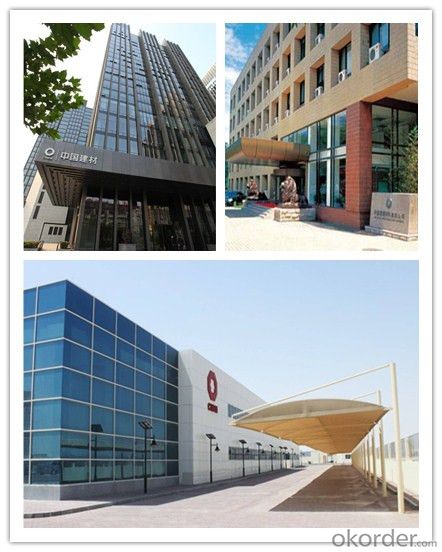
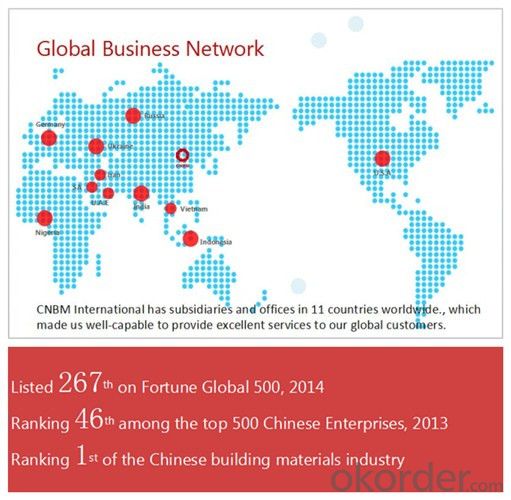
| After-sale service | l CNBM provides the services and support you need for every step of our cooperation. We’re the business partners you can trust; you can relax and get on with doing business. |
| l For any problem, please kindly contact us at any your convenient time, we’ll reply you in our first priority within 24 hours | |
| Advantages | l Industry experience over 20 years. |
| l Shipment of goods -More than 70 countries worldwide. | |
| l The most convenient transport and prompt delivery. | |
| l Competitive price with best service. | |
| l High technical production line with top quality products. | |
| l High reputation based on best quality products. | |
Packaging & Delivery of Special Steel 8620H 40CrNiMoA Iron Round Steel Bar
| Packaging Detail | Sea worthy packing /as per customer's packing instruction |
| Delivery Detail | 15 ~ 40 days after receiving the deposit |
Products Show
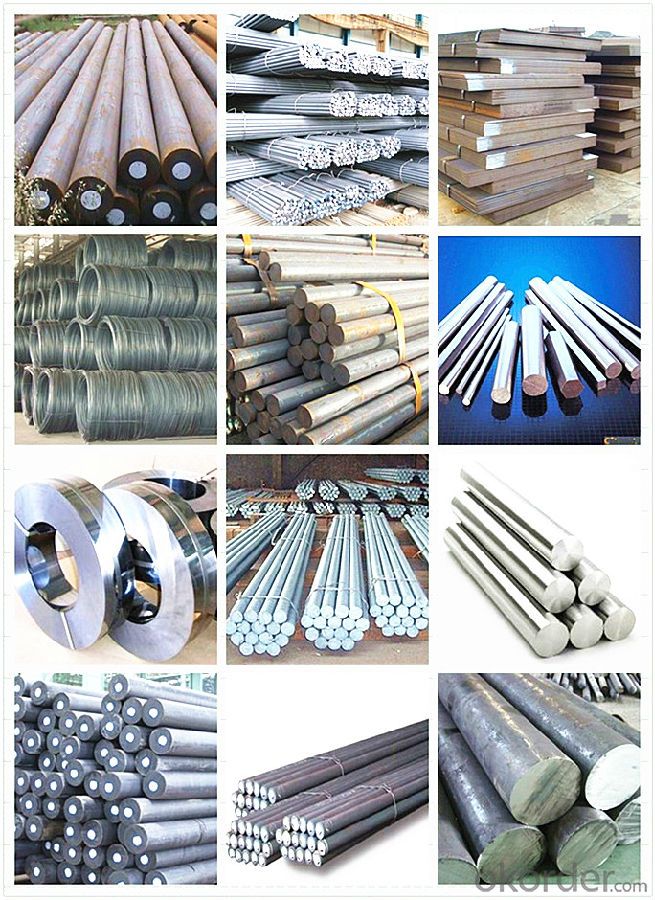
FAQ:
| Are you a trading company or manufacturer? | Manufacturer |
| What’s the MOQ? | 1000m2 |
| What’s your delivery time? | 15-20 days after downpayment received |
| Do you Accept OEM service? | Yes |
| what’s your delivery terms? | FOB/CFR/CIF |
| What's the Payment Terms? | 30% as deposit,70% before shipment by T/T |
| Western Union acceptable for small amount. | |
| L/C acceptable for large amount. | |
| Scrow ,Paybal,Alipay are also ok | |
| Why choose us? | Chose happens because of quality, then price, We can give you both. Additionally, we can also offer professional products inquiry, products knowledge train (for agents), smooth goods delivery, excellent customer solution proposals. |
| What's your available port of Shipment? | Main Port, China |
| What’s your featured services? | Our service formula: good quality+ good price+ good service=customer's trust |
| Where are your Market? | Covering more than 160 countries in the world |
- Q: Can special steel be cast?
- Yes, special steel can be cast.
- Q: How is special steel used in the aerospace industry?
- Special steel is used in the aerospace industry for various applications, including the manufacturing of critical components such as jet engines, landing gear, and airframe structures. Due to its exceptional strength, corrosion resistance, and heat resistance properties, special steel ensures the safety, durability, and performance of aircraft while operating under extreme conditions.
- Q: What are the different passivation techniques used for special steel?
- There are several passivation techniques used for special steel, including chemical passivation, electrochemical passivation, and mechanical passivation. Chemical passivation involves using acids or other chemicals to remove surface impurities and create a protective oxide layer. Electrochemical passivation uses an electrical current to remove contaminants and promote the formation of a passive layer. Mechanical passivation involves techniques such as shot peening or sandblasting to physically clean and roughen the surface, enhancing its corrosion resistance.
- Q: What are the applications of special steel in the manufacturing sector?
- Special steel has a wide range of applications in the manufacturing sector, including the production of tools, machinery, automotive components, and construction materials. Its exceptional strength, durability, and resistance to corrosion make it ideal for manufacturing applications that require high performance and reliability. Furthermore, special steel can be tailored to specific requirements, enabling manufacturers to create customized products with enhanced properties, such as heat resistance or hardness. Overall, special steel plays a crucial role in various industries, contributing to the advancement and efficiency of the manufacturing sector.
- Q: What are the corrosion resistance properties of special steel?
- Special steel, also known as stainless steel, exhibits excellent corrosion resistance properties. This is primarily due to the presence of chromium, which forms a protective layer on the surface of the steel, preventing oxidation and corrosion. Additionally, special steel alloys may contain other elements such as nickel, molybdenum, and titanium, further enhancing their corrosion resistance. These properties make special steel highly suitable for various applications in industries such as construction, automotive, and aerospace, where resistance to corrosion is essential for long-term durability and performance.
- Q: How does special steel contribute to the power generation aftermarket industry?
- Special steel plays a crucial role in the power generation aftermarket industry by providing enhanced strength, durability, and corrosion resistance to critical components such as turbine blades, generator rotors, and boiler tubes. These advanced steel alloys enable power plants to operate at higher temperatures and pressures, resulting in increased efficiency and power output. Additionally, special steel's ability to withstand extreme conditions helps to reduce maintenance and downtime, ensuring reliable and uninterrupted power generation.
- Q: Can special steel be used in the railway industry?
- Yes, special steel can be and is commonly used in the railway industry. Special steel alloys such as manganese steel, stainless steel, and wear-resistant steel are often utilized in the manufacturing of railway tracks, wheels, axles, and other components. These special steel materials offer enhanced strength, durability, and resistance to corrosion and wear, making them ideal for withstanding the heavy loads, frequent use, and harsh environmental conditions experienced in the railway industry.
- Q: What are the different marine grades of special steel?
- There are several marine grades of special steel commonly used in marine applications. Some of the most widely known grades include 316, 316L, and 2205. These grades are specifically designed to resist corrosion and maintain their strength and integrity in harsh marine environments. Additionally, other grades such as 304 and 904L are also used in marine applications for their corrosion resistance properties.
- Q: How does special steel contribute to the automotive racing machinery industry?
- The automotive racing machinery industry greatly relies on special steel to enhance the performance, durability, and safety of racing vehicles. One significant benefit of special steel is its ability to boost the power and speed of racing cars. Steel alloys like carbon fiber-reinforced steel or high-strength steel offer exceptional strength-to-weight ratios, enabling manufacturers to reduce vehicle weight without compromising structural integrity. This weight reduction enhances acceleration and maneuverability, resulting in increased speed and improved lap times on the track. Apart from performance improvements, special steel also makes racing vehicles safer. Certain steel alloys possess high strength and impact resistance, making them ideal for constructing roll cages, chassis, and other critical safety components. These materials can withstand extreme forces during crashes or collisions, providing enhanced protection for drivers and minimizing the risk of severe injuries. Special steel also contributes to the longevity and durability of automotive racing machinery. The demanding conditions of racing, including high temperatures, vibrations, and mechanical stress, can quickly deform or deteriorate regular steel. However, special steel alloys are specifically engineered to withstand these harsh environments, ensuring racing cars can withstand the sport's rigorous demands without compromising performance or safety. Furthermore, special steel alloys offer excellent thermal conductivity and heat resistance, which are essential for racing vehicles that generate substantial heat during high-speed runs. By efficiently dissipating heat, special steel helps prevent overheating and ensures optimal engine performance, minimizing the risk of mechanical failures and maximizing the lifespan of racing machinery. In summary, special steel significantly contributes to the automotive racing machinery industry by enhancing the performance, durability, and safety of racing vehicles. The use of high-performance steel alloys increases speed, improves lap times, and reduces vehicle weight. Additionally, it provides superior strength and impact resistance, enhancing safety during crashes or collisions. Moreover, special steel alloys offer excellent heat resistance and thermal conductivity, ensuring optimal engine performance and prolonging the lifespan of racing machinery.
- Q: Can special steel be used for structural applications?
- Yes, special steel can be used for structural applications. Special steel refers to steel that has been alloyed or modified to possess specific properties such as enhanced strength, durability, or corrosion resistance. These qualities make special steel suitable for various structural applications where high performance and reliability are required, such as in the construction of buildings, bridges, and offshore platforms.
Send your message to us
Special Steel 8620H 40CrNiMoA Iron Round Steel Bar
- Loading Port:
- Qingdao
- Payment Terms:
- TT OR LC
- Min Order Qty:
- 5 m.t.
- Supply Capability:
- 100000 m.t./month
OKorder Service Pledge
Quality Product, Order Online Tracking, Timely Delivery
OKorder Financial Service
Credit Rating, Credit Services, Credit Purchasing
Similar products
Hot products
Hot Searches
Related keywords
